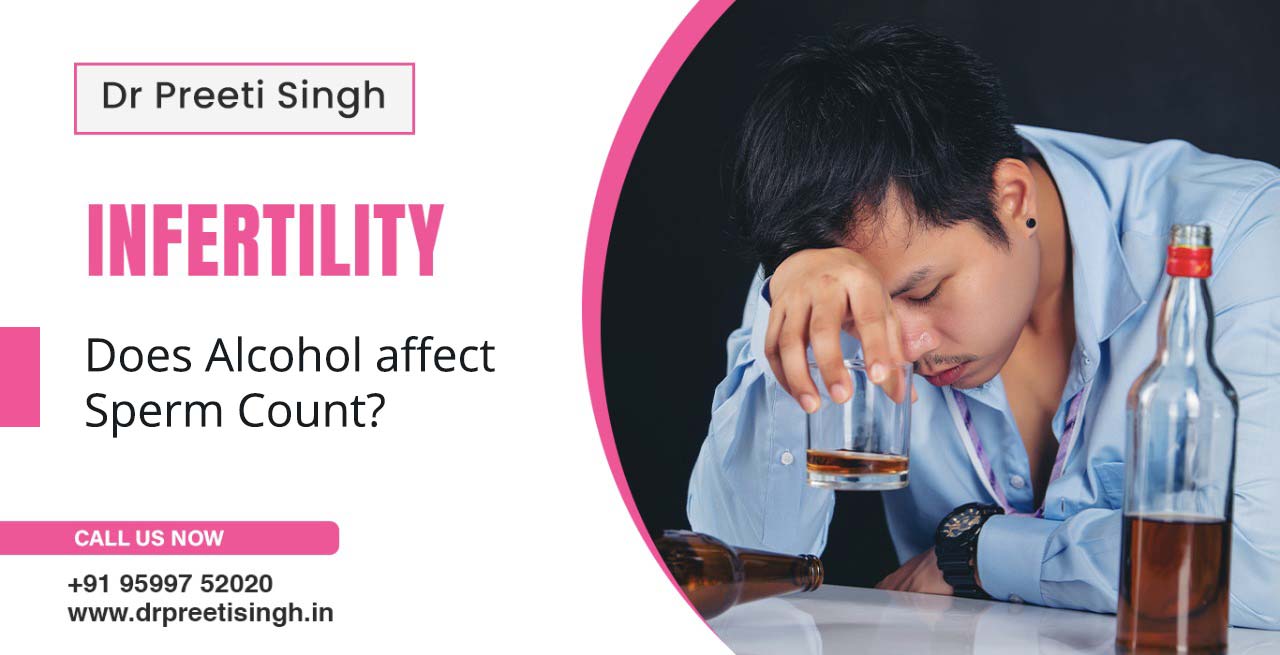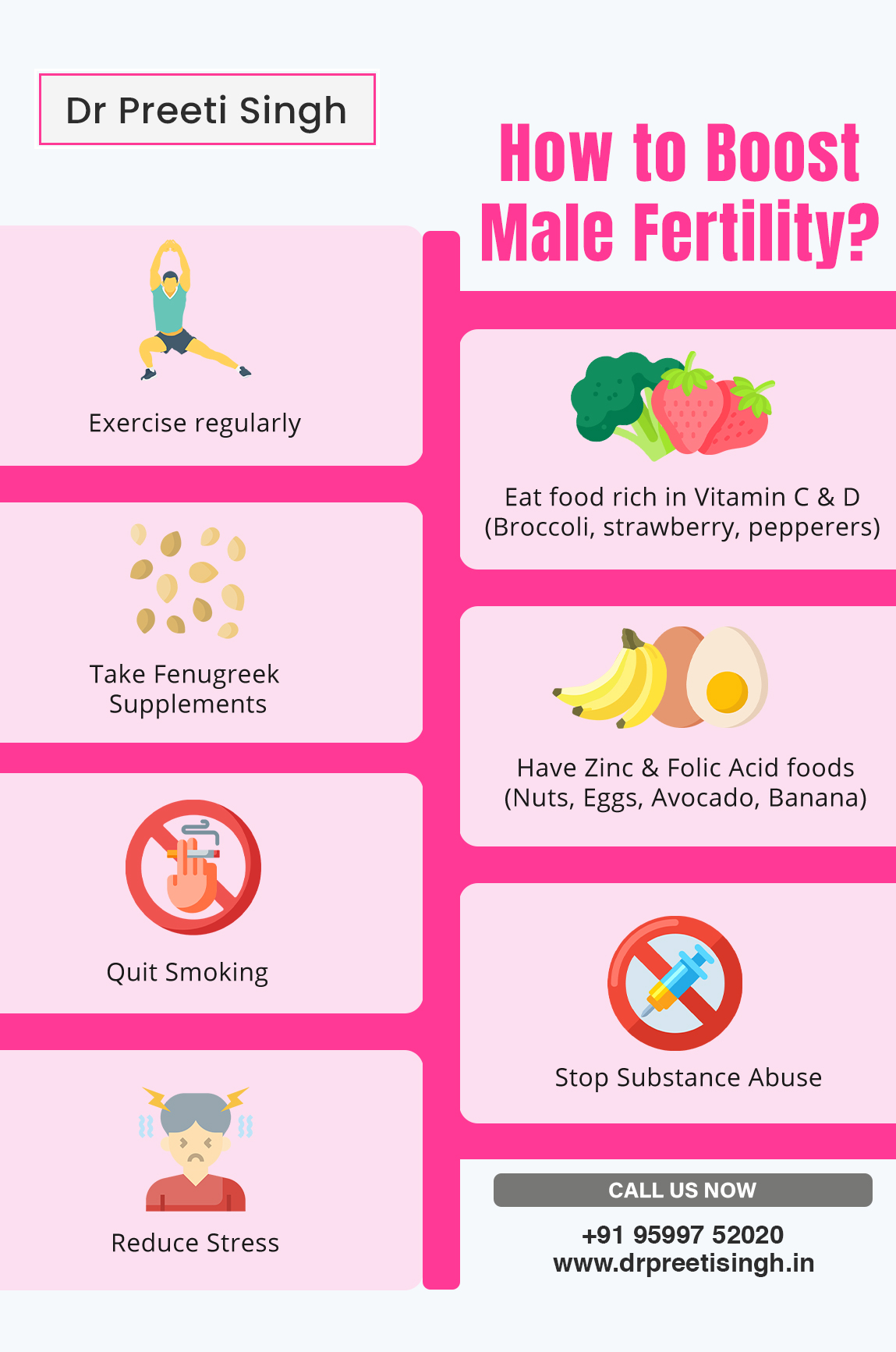Infertility: Does Alcohol Affect Sperm Count and other fertility facts?

Infertility is when a couple fails to conceive after one year of unprotected intercourse. About 15% of couples suffer from one form of infertility or the other. About 40% of men and women deal with infertility. In some cases, both the partners contribute to infertility i.e., 25 to 30% of the cases. Habits such as alcohol are not viewed differently anymore, and about 72% of men have consumed alcohol at some point or the other. When faced with infertility, a lifestyle change is warranted, and giving up or reducing alcohol intake might help. Dr. Preeti Singh, a top gynecologist in Noida, can help.
Table of Contents
Feel free to skip ahead if one topic catches your eye:
- Does Alcohol Affect Sperm count?
- What amount of Alcohol impacts male fertility?
- Other Effects of Alcohol on Male Fertility
- How does Alcohol impact Female Fertility?
- When to seek help?
- Infertility treatment in Noida
1. Does Alcohol Affect Sperm Count?
The alcohol effect on sperm, especially its quality, has been well documented. It affects the shape, size, count, and motility. The sperm development and its function depend on the male hormone called testosterone. Spermatogenesis is the process of development of sperms from their initial stage called spermatozoa into fully active forms capable of fertilizing an egg.
The correct sequence of spermatogenesis is- the spermatozoa undergo mitosis, a type of cell division that increases the cell number, followed by meiosis, a differentiating type of cell division after which the sperm cells develop into the spermatozoon, simply called the sperms.
Testosterone is vital for the normal development of sperms. The factors affecting spermatogenesis include excessive alcohol intake that negatively influences testosterone levels, decreases the FSH or follicle-stimulating hormone, impairs the gonadotropin, causes an increase in estrogen levels, causing a reduction in the development of sperms.
Can a man drink alcohol when trying to conceive?
Moderate intake of beer, wine, and vodka may protect the sperm from damage and boost sperm quality. Alcoholic drinks in excess and in any form can hamper the development and function of the sperm. If you are skeptical wondering “does alcohol affect sperm count”, you are right, it does.
Does red wine affect sperm count?
Red wine contains antioxidants such as myricetin, quercetin, and resveratrol that improve the function of sperms, but in moderate quantities only. Excessive intake of beer and wine impairs sperm function thereby decreasing male fertility, studies indicate.
An occasional drink does not affect sperm count drastically. But, excessive drinking affects the sperm count and a man’s fertility. Contrary to popular belief, vodka is equally bad, if not more so than the other forms of alcohol in decreasing sperm count and quality in excessive quantities. The alcohol effect on sperm has been proven by research and found to be detrimental to the growth and development of the sperm, especially for a couple struggling with infertility.
Does beer affect sperm count?
The answer is yes. Research has demonstrated that beer intake had a detrimental effect on the sperm count, along with damaging the liver, kidney, and other organs.
A study by the National Institute of Health (NIH) showed that excessive alcohol intake influenced sperm quality by the following mechanisms:
- Decrease in the level of testosterone hormone
- Lowered concentration and volume of sperm
- A reduction in the motility of the sperm
2. What Amount of Alcohol Impacts Male Fertility?
Moderation is a very relative term and may be interpreted differently depending on the individual. To standardize what qualifies as excessive, a national survey on drug use and health suggests the following ranges:
| Consumption level | No of drinks/ days |
|---|---|
| Current use | ≥ 1 drink in the past 30 days |
| Moderate use | 2 drinks per day for men |
| Binge drinking | Causing a rise in the BAC to 0.08 g/dL -5 drinks for men in 2 h |
| Heavy alcohol use | Binge drinking on ≥ 5 days in the past month |
A standard drink is defined as follows:
- One glass of wine (5 ounces containing 12% alcohol)
- One beer (12 ounces containing 5% alcohol)
- One serving of malt liquor (8 ounces containing 7% alcohol)
- One shot of distilled spirits (1.5 ounces of 80 proof liquor containing 40% alcohol)
3. Other Effects of Alcohol on Male Fertility
Apart from decreasing sperm quality, alcohol intake also contributes to decreasing the sex drive (libido), sexual performance in terms of erection, penetration, and effective ejaculation contributing to decreased fertility in men. A decrease in libido makes it harder to perform or have the desire to perform sexually. This can lead to decreased sex frequency, leading to a reduced possibility of pregnancy.
Can a man drink alcohol while trying to conceive?
Excessive alcohol intake causes an early or decreased ejaculation, affecting the release of gonadotropin, which in turn influences sperm production and quality. As alcohol may cause low testosterone levels, this may lead to damage to tissues in the testes as well as shrink the testes.
Does alcohol affect sperm while trying to get pregnant?
Alcohol excess may drastically affect the quality of the sperm. Research has found that men who drink excessively are more prone to have abnormal sperms. This can include the motility, size, shape, and count of the sperm. In some men who drink alcohol, there is no sperm in the semen, making it impossible for them to father a child naturally.

4. How Does Alcohol Impact Female Fertility?
In most cases, the fertility specialist will recommend women who are trying to conceive stay away from drinking alcohol. Alcohol intake in women has been found to affect ovulation, affect egg quality, and implantation of the fertilized egg in the uterus.
Does alcohol affect fertility in females?
Women who are trying to conceive are already struggling with physical issues contributing to infertility and alcohol consumption will only add fuel to the fire. Alcohol causes the fertility of a woman to be highly compromised leading to reverberations such as:
- An excessive body weight
- Risk of a sexually transmitted disease
- Irregular menstrual cycles induced by hormonal imbalance
- Possibility of reproductive disorders
- Affecting ovulation and thereby depleting the reserve egg numbers
- Organ damage
It is a widely publicized fact that alcohol can damage the unborn child, and it's true. Drinking during pregnancy increases the risks of low birth weight, preterm birth, along with birth defects in the fetus. Women beginning in vitro fertilization (IVF) treatment and had four or more drinks per week were 16 percent more likely to have a stillbirth than those who did not drink.
Can alcohol stop ovulation?
Definitely. It has been proved that alcohol intake in women can impair the ovulation process and cause problems with egg release, reducing the chances to conceive.
Can beer cause miscarriage?
Studies have found that drinking beer more than two to three times per week can cause miscarriage especially, early on in the pregnancy, and contribute to first-trimester pregnancy loss.
Damage to the fetus due to alcohol intake can begin as early as conception, killing the just-fertilized egg. Alcohol-induced birth defects can affect the developing embryo starting from three weeks post-fertilization. This affects the development of the brain, heart, and central nervous system, and the development of the facial features known as “fetal alcohol syndrome”.
5. When to Seek Help?
If you are trying to conceive, and wondering if you or your partner’s drinking habit is hindering the way, it's time for you to seek help. Consult your fertility specialist for an assessment on how far along you are and work together with support groups to help you understand and cut down or quit drinking along the journey of having a baby.
6. Infertility Treatment in Noida
If you are struggling with infertility and anxious to make it before the biological clock ticks away, you may need to assist your body to help you conceive. Dr. Preeti Singh, an infertility expert in Noida offers the best infertility treatment that can guide you through the host of fertility options available. She will be the best person to guide you about the best choice. The cost of infertility treatment can range from 50,000 INR to about 2,50,000 INR for a single IVF cycle.
The cost will depend on the cause of your infertility- as assessed by your infertility specialist and where it comes from (you, your partner, or both), the type of infertility treatment required, the standard of techniques used, the doctor’s experience, the success rates of the clinic, and the location of the clinic. Consult with your infertility expert to know exactly what you need and how much it will cost.
Takeaway
Dr. Preeti Singh is a renowned Obstetrician-Gynaecologist in Noida. At her clinic, your fertility-related issues will be dealt with great care and expertise.